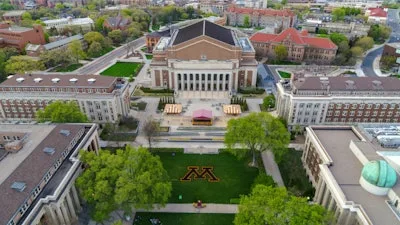Some Native Americans are calling for U.S. higher ed institutions – many of which were built on tribal lands – to make amends and give reparations, The Washington Post reported.
“You have these schools that have tens of millions of dollars at their disposal, but they are not looking at any ways they can improve living situations for Indigenous peoples today,” said An Garagiola, a descendant of the Bois Forte Band of Chippewa. “Yet their existence as institutions, as schools of learning, are only there today because of everything that was taken.”
Over a century ago, 11 Native American tribes sold nearly 94,440 acres of land at a cheap price to make room for what is now the University of Minnesota, marking the start of what researchers say was a long, toxic relationship. At the University of Minnesota now, the 11 tribes – including Red Lake Nation and the Fond du Lac Band of Lake Superior Chippewa – are asking for reparations for the complex harms done.
“We welcome the opportunity to examine the university’s history. It is important that we work in collaboration with the tribal nations to chart our course from here,” Janie Mayeron, chair of the University of Minnesota Board of Regents, said at a May board meeting.
Some schools – such as Cornell University, The University of Wisconsin at Madison, and University of California system – have made varying efforts in recent years to address their histories with tribal lands, including through research projects, free tuition pledges, and flags.
But so far, schools have made insufficient strides in terms of real reparations and structural changes, according to native advocates.
All this is happening amid calls for reparations towards Black Americans, with efforts such as monetary support being considered. Notably, reparations for the two groups have important differences, advocates said.
Federally recognized tribes have a unique political relationship with the U.S., with Indigenous nations governing themselves independently, said Rebecca Tsosie, a University of Arizona law professor who is of Yaqui descent.
“There is no other group that has that form of a claim,” Tsosie said. “Indigenous peoples are still in their context of separate and distinct peoples. So as nations, other nations within the nation.”
This reckoning with Native communities was sparked by a 2020 High Country News article about “land-grab universities” that described how 10.7 million acres of land was taken from 250 tribes after the signing of the 1862 Morrill Act, which turned land expropriated from tribal nations into seed money for higher ed.
“I do not see how much compensation you can get for a mass amount of genocide without trying to restructure economies at large scale, restructure how we connect with land, and how we utilize land. Which I just do not see is possible under capitalism in a certain way,” said Dr. Kyle Mays, a UCLA associate professor of African American studies and American Indian studies. He is Black and Indigenous.

